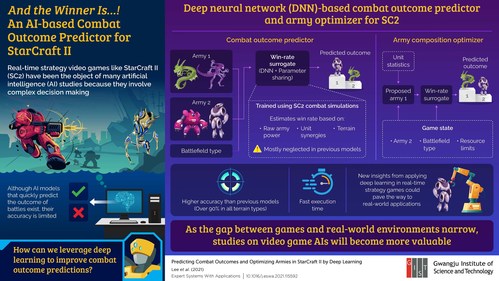GWANGJU, South Korea, Jan. 19, 2022 /PRNewswire/ — As the need for more sophisticated artificial intelligences (AIs) grows, the challenges that they must face along the way have to evolve accordingly. Real-time strategy (RTS) video games, unlike turn-based board games such as chess, can serve as a vast playground for pushing the limits of AI. In particular, StarCraft II (SC2), one of the world‘s most popular and skill-demanding RTS games, has already been the object of a few groundbreaking AI-related studies.
In SC2 matches, each player has to build up and command an army of varied units to defeat their opponent using wit and grit. While AI-based systems can excel at many aspects of the game, improving their decision-making regarding when their units should be sent to or relocated during a battle is remarkably difficult. This is because armies can be composed of virtually endless combinations of different units that synergize depending on various factors. In addition, the characteristics of the battlefield (‘terrain‘) where the combat takes place can have a decisive impact on the outcome. So far, no study has focused on both of these aspects simultaneously for making AI-based combat outcome predictions—an essential skill for any SC2 player.
In a recent study, a team of scientists from the Gwangju Institute of Science and Technology (GIST) in Korea tackled this issue using a deep learning-based approach. By building and training a deep neural network (DNN) model, the researchers developed a system that could predict the outcome of an SC2 battle by simultaneously considering the detailed composition of the opposing armies and the type of terrain they would fight at. Their paper was made available online on July 24, 2021, and was published in Volume 185 of Expert Systems With Applications on December 15, 2021.
The proposed DNN model leveraged a technique called ‘parameter sharing,‘ which allowed it to effectively and precisely analyze the circumstances of the battlefield in a very short time. "Our AI was capable of taking numerous complex factors into consideration to predict the overall combat result. When implemented, such a model would help an AI player make proper decisions with regards to its offensive and defensive strategies," highlights Professor Chang Wook Ahn, who led the study.
Perfecting the way an AI makes decisions in a complex video game like SC2 will eventually lead to AI-based systems that can assess and correctly tackle difficult situations in the real world. As Prof. Ahn explains: "We believe that the AIs used in gaming and in industry are not that different and that more AI applications will soon become tangible in our daily life. Thus, our continued study in this topic could become one of the cornerstones of the global endeavor to develop AIs that can perceive situations and behave logically."
It‘s very likely that studies on video game AI systems will become increasingly valuable as the gap between games and real-world environments narrows, so keep an eye out for further advances in this field!
Reference
Title of original paper: Predicting combat outcomes and optimizing armies in StarCraft II by deep learning
Journal: Expert Systems With Applications
DOI: https://doi.org/10.1016/j.eswa.2021.115592
About the Gwangju Institute of Science and Technology (GIST)
Website: http://www.gist.ac.kr/
Corresponding author‘s email:
327869@email4pr.com
Contact:
Seulhye Kim
82 62 715 6253
327869@email4pr.com
SOURCE Gwangju Institute of Science and Technology


